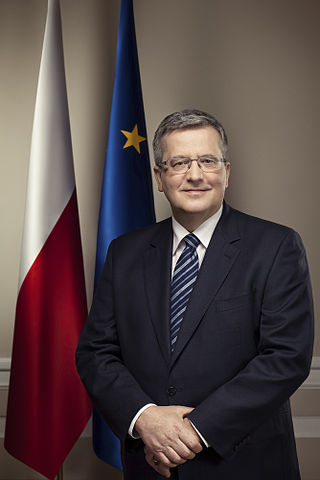 Polish President Bronislaw Komorowski’s shock setback in the first round of the presidential election spells serious trouble for the governing liberals just months ahead of the parliamentary polls.
Polish President Bronislaw Komorowski’s shock setback in the first round of the presidential election spells serious trouble for the governing liberals just months ahead of the parliamentary polls.
The 62-year-old incumbent conceded defeat late Sunday to conservative opposition challenger Andrzej Duda, whom he will face in the May 24 run-off, though official results are only expected late Monday at the earliest.
But exit polls painted a grim picture for Komorowski, who had been the frontrunner in pre-election opinion polls and is close to the centrist Civic Platform (PO) that has governed Central Europe’s largest economy since 2007.
Duda, a 42-year-old lawyer backed by the Law and Justice (PiS) conservative opposition party, scored 34.5 percent against Komorowski’s 33.1 percent, with rock star and political novice Pawel Kukiz trailing at 20.5 percent, according to an exit poll by the Ipsos survey company.
“Yellow card for PO,” said political analyst Stanislaw Mocek. “The people don’t want a team at the helm that is content with running the country, handling day-to-day affairs without introducing any real reform.”
Komorowski, a historian who took office in 2010 after the death of his PiS predecessor in a plane crash, himself dubbed the first-round outcome as “a serious warning for the entire governing camp”.
The president has limited powers, which include steering defence and foreign policy and the right to veto legislation in Poland, a central European powerhouse of 38 million people and EU member since 2004.
– Coffee by the subway –
Komorowski on Monday took up the main concerns of Kukiz, the anti-establishment rocker who proved popular with young voters, and announced two initiatives regarding parliamentary polls: a referendum on introducing a single-member district election system and scrapping state financing of political parties.
Duda — whose PiS party is led by Jaroslaw Kaczynski, a former premier and twin brother of the late president Lech Kaczynski — also sought to appeal to youths but with a more hands-on approach.
His staff handed out free coffee outside the subway during the Monday morning commute while Duda assured young voters that if elected he would try to change the constitution with an eye towards solving their problems.
A former defence minister, Komorowski campaigned on national security concerns raised by Russia’s meddling in neighbouring conflict-torn Ukraine.
Poland’s top two dailies on Monday attributed Komorowski’s surprise setback to having run a lacklustre campaign and lost touch with voters.
But for political analyst Eryk Mistewicz, the surprise outcome “highlighted a divide between people who benefitted during the 25 years since the fall of communism in 1989, and those who feel lost”.
“Voters are saying you have to slow down and be more honest, creating a less liberal Poland, focussed more on social welfare,” he told AFP.
Political analyst Radoslaw Markowski for his part pointed to the below 50 percent turnout for Sunday’s election.
“Such low turnout, especially in big cities, is a sign of the growing discouragement of the incumbent’s potential electorate. The outcome is more of a loss for Komorowski than a victory for Duda,” he told AFP.
Analysts say that a Duda win in the run-off would boost his party’s chances of dominating the autumn parliamentary vote.
“With Andrzej Duda, a young politician and relatively unknown, voters seem to have accepted a new image of PiS,” said Mocek.
“The results of the autumn parliamentary polls will in large part depend on who wins the presidential vote.”
Duda’s campaign centred around promises of generous social spending as well as lowering taxes and the retirement age.
Unlike Komorowski, he agrees with Poland’s powerful Catholic Church in its opposition to in-vitro fertilisation. Duda also won the support of the Solidarity trade union.
The rivals will face off in a televised debate before round two.



